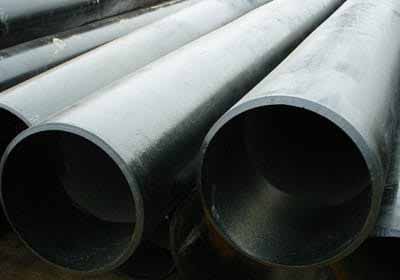Alloy steel pipes are among the most widely used materials in industries that require high strength, durability, and resistance to extreme conditions. One such prominent type is Alloy Steel P92 Pipes, known for their excellent mechanical properties and high-temperature performance. These pipes are commonly utilized in various industries, including power generation, petrochemicals, oil and gas, and construction. In this blog, we will explore the different applications of alloy steel pipes and their significance in modern industrial operations.
1. Power Generation Industry
The power sector heavily relies on alloy steel pipes, particularly in high-pressure and high-temperature environments. These pipes are used in boilers, heat exchangers, and steam pipelines where they must withstand intense heat and pressure.
- Boiler Tubes: Alloy steel pipes are extensively used in boiler systems to transport steam at high pressures. Their resistance to oxidation and corrosion makes them ideal for such applications.
- Heat Exchangers: Heat exchanger systems in power plants utilize these pipes for the efficient transfer of heat between fluids, ensuring optimal thermal efficiency.
- Steam Pipelines: High-pressure steam is transported through alloy steel pipes to drive turbines, making them crucial for energy production.
2. Oil and Gas Industry
The oil and gas sector is one of the primary users of alloy steel pipes due to their ability to withstand harsh environmental conditions, including high pressures and corrosive substances.
- Pipeline Transportation: These pipes are used in the transmission of crude oil, natural gas, and refined petroleum products over long distances.
- Drilling Operations: In offshore and onshore drilling, alloy steel pipes play a crucial role in casing and tubing applications, providing structural integrity.
- Refineries: Refineries require durable piping systems to handle high temperatures and aggressive chemicals in refining processes.
3. Petrochemical Industry
Petrochemical plants operate in environments where pipes must handle high temperatures and corrosive substances. Alloy steel pipes are preferred due to their superior resistance to chemical degradation.
- Chemical Processing Units: Various petrochemical processes involve the transport of corrosive chemicals, where alloy steel pipes ensure safety and longevity.
- Storage and Distribution: These pipes are used in storage facilities and distribution networks for various petrochemical products.
- Cryogenic Applications: Certain alloy steel grades are used in cryogenic applications, where they maintain their strength at extremely low temperatures.
4. Construction and Infrastructure Development
The construction industry benefits significantly from the high strength and durability of alloy steel pipes. They are used in:
- Structural Frameworks: Buildings, bridges, and industrial structures rely on these pipes for support and stability.
- Water and Sewage Systems: Due to their corrosion resistance, alloy steel pipes are used in underground piping for water supply and sewage disposal.
- Fire Protection Systems: These pipes are used in fire sprinkler systems due to their strength and ability to withstand high temperatures.
5. Automotive and Aerospace Industry
Alloy steel pipes find applications in both automotive and aerospace industries, where high performance is required.
- Exhaust Systems: Automotive exhaust systems use alloy steel pipes to withstand high temperatures and resist corrosion.
- Aircraft Hydraulic Systems: Aerospace components require lightweight yet strong materials, making alloy steel pipes suitable for hydraulic systems and fuel lines.
- Engine Components: Certain alloy steel grades are used in engine manufacturing due to their ability to withstand high mechanical stress.
6. Marine and Shipbuilding Industry
The marine industry requires materials that can endure prolonged exposure to seawater and harsh marine environments.
- Ship Construction: Alloy steel pipes are used in the construction of ship hulls, pipelines, and exhaust systems.
- Offshore Platforms: Oil rigs and offshore platforms rely on these pipes for structural integrity and fluid transport.
- Desalination Plants: Alloy steel pipes play a role in desalination plants where seawater is converted into freshwater.
7. Food and Beverage Industry
In food processing industries, hygiene and corrosion resistance are crucial factors.
- Processing Equipment: Alloy steel pipes are used in food processing plants to transport liquids, gases, and other raw materials.
- Brewing and Dairy Industries: These pipes ensure that beverages and dairy products are processed and transported without contamination.
- Sanitary Applications: Certain grades of alloy steel pipes are used in sanitary piping systems to meet hygiene standards.
8. Pharmaceutical Industry
The pharmaceutical industry demands high-purity piping systems that can withstand aggressive cleaning agents and high temperatures.
- Chemical Synthesis Units: Alloy steel pipes are used to transport chemicals involved in drug manufacturing.
- Sterile Processing: These pipes ensure that pharmaceutical products remain uncontaminated throughout processing.
- Biotechnology Applications: Alloy steel pipes are also utilized in biotechnological processes that require clean and sterile environments.
Advantages of Alloy Steel Pipes
The widespread use of alloy steel pipes across industries is due to their numerous advantages:
- High Strength and Durability: These pipes can withstand extreme pressure and temperature conditions.
- Corrosion and Oxidation Resistance: They offer excellent resistance to chemical and environmental degradation.
- Versatility: Alloy steel pipes can be customized for various industrial applications.
- Cost-Effective: Their long service life and low maintenance requirements make them a cost-effective solution.
- Lightweight and High Performance: Certain alloy steel grades provide a perfect balance between weight and strength.
Conclusion
Alloy steel pipes, including Alloy Steel P92 Pipes, are an essential component in numerous industries due to their superior mechanical properties and resilience to harsh conditions. From power generation to aerospace, these pipes provide a reliable and efficient solution for fluid transport, structural applications, and industrial processing. Their adaptability and high performance continue to make them a preferred choice for industries worldwide.

















